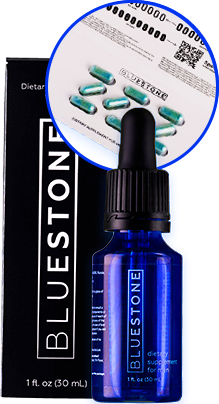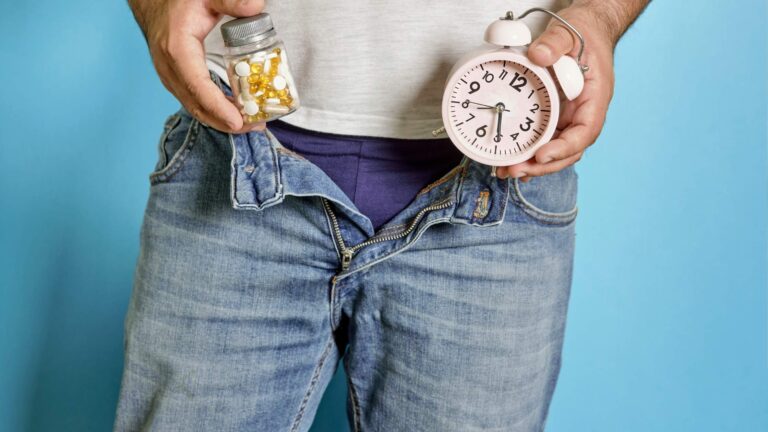Thinking about a hard weapon Viagra-like?
- What about some vitamins to make you last longer in bed?
- Vitamin B3 or Niacin for ED treatment
- Glutathione and Erection
- Betaine and Testosterone Boosting
- Selenium and Sperm Increasing
- FAQ Section
- Question: Can vitamins help me last longer in bed?
- Question: Which vitamins should men add to their diet for better sexual health?
- Question: Can sunlight exposure improve sexual health?
- Question: What is the role of glutathione in sexual health?
- Question: Can magnesium and zinc improve testosterone levels and erectile function?
- Question: Should I consider a prostate supplement for improved erectile function?
What about some vitamins to make you last longer in bed?
It is important to understand that vitamins cannot directly help you stay in bed longer.
But vitamins and minerals play a very important role in keeping your body and brain healthy. You can improve your sexual status and erection strength by improving your health.
If you’re looking for vitamins to make you last longer in bed, don’t forget a balanced diet, daily exercise, and a good night’s sleep. – Okay?
Simple changes to your daily routine can boost your libido and improve your erectile function.
Of course, we all need adequate replenishment of vitamins and minerals, and additional supplements may also be required.
This section is a quick list of vital things that men should add to their diet.
Folic acid for Erectile Dysfunction
Folic acid supplementation improves erectile function. Recently, a lot of evidence has emerged indicating the role of folic acid in erectile function. The study showed improvement in the severity of ED in patients as all of them became mild to moderate ED after folic acid administration.
Folic acid deficiency leads to a decrease in DNA synthesis and, consequently, to a decrease in cell division. Although DNA synthesis occurs in all dividing cells, a deficiency is most often seen in tissues with a high cell turnover rate, such as erythrocytes (red blood cells). Thus, the main clinical observation associated with folic acid deficiency is megaloblastic anemia.
Vitamin B12 for Erectile Disfunction
Vitamin B12 also called cobalamin, is an essential factor in the production of red blood cells. Guys who do not have enough B12 in their systems suffer from anemia. B12 is also necessary for the production of other blood cells, as well as normal neurologic function. Someone with severe B12 deficiency may have anemia as well as a variety of neurologic and psychiatric problems.
Vitamin B3 or Niacin for ED treatment
Niacin (nicotinic acid) is a vitamin, a substance that is necessary to prevent pellagra. Pellagra is known by the four Ds, which are dermatitis (skin rash), diarrhea, dementia (altered mental function), and death. This disease usually occurs in people eating a diet that is severely deficient in niacin.
In the body nicotinic acid is converted to NAD and NADP. These chemicals are coenzymes necessary for hundreds of reactions in which oxidation-reduction occurs. These energy-producing reactions are essential for many cellular functions in your body. Among many other things, NAD is also critical to many processes in which components are added to proteins inside cells.
Niacin is one of the many drugs used to lower the risk of coronary heart disease as well as other vascular diseases caused by elevated cholesterol and plaque formation.
The study show Niacin alone can improve erectile function in patients suffering from moderate to severe ED and dyslipidemia.
vitamin d benefits for men
Vitamin E and male sexual health
Vitamin E is an antioxidant. It scavenges free radicals in the body and prevents DNA damage and blood vessel damage.
So, Vitamin E may improve erections by increasing blood flow and oxygenation to the penis
Vitamin E was discovered over 80 years ago as a substance necessary for female rats to reproduce. Many years of research have answered some questions about this fat-soluble vitamin and its actions in humans.
And now we are using the vitamin to prevent a number of diseases.
Injection of Selenium and vitamin E had a significant effect on volume, concentration, libido, total sperm count, mass movement of sperm, viability, testosterone, and reduced sperm abnormality in treated ram 2013.
Camel experiment
This study aimed to investigate the impact of zinc, selenium, and vitamin E combinations on sperm quality and fertility in male dromedary camels with infertility.
In conclusion, zinc, selenium, and vitamin E administration improved sperm quality and fertility in male dromedary camels with male infertility.

Vitamin D – Vitamin to Boost Your Libido
Vitamin D isn’t technically a vitamin, despite its name. The name actually encompasses a vitally important group of micronutrients. It is a potent steroid hormone responsible for switching our genes on or off. It is structurally similar to steroids like testosterone, cholesterol, and cortisol. In other words, it’s more of a hormone than it is a vitamin, and that’s why we highly recommend having your Vitamin D levels checked with a simple blood test.
Vitamin D’s effects are varied and profound. It is essential to the formation of male sperm cells and the production of natural and free testosterone.
Vitamin D has also been associated with higher levels of testosterone and Sex Hormone Binding Globulin. On top of its positive testosterone-boosting effects, Vitamin D is essential for cell-to-cell communication.
The Sun Is Your Best Source of Vitamin D
Get out in the sun for a bare minimum of 10 minutes a day for at least 3-4 days per week.
If you live in a place where sunlight is hard to come by, visit a tanning salon that uses harmful ultraviolet (UV) spectrum rays.
Remember: You need sunlight, and where the sunlight is hard to come by, you need a workaround solution.
Sunlight exposure increases the body’s production of melanin. Melanin is a very powerful hormone, allowing for the skin to naturally darken when exposed to the sun’s UV rays.
Melanin is depicted as an organizational “trigger” capable of using established properties such as photon-(electron)-photon conversions, free radical-redox mechanism, ion exchange mechanisms, and semi-conductive switching capabilities to direct energy to strategic molecular systems and sensitive hierarchies of protein enzyme cascades. Melanin is held capable of regulating a wide range of molecular interactions and metabolic processes.”
Glutathione and Erection
Glutathione is a tripeptide with many important actions throughout the human body. It is an antioxidant and can prevent cellular damage.
When glutathione levels are low, the body is more susceptible to oxidative stress, which may contribute to the development of cancer, Alzheimer’s disease, Parkinson’s disease, and more.
Glutathione plays a role in many cellular processes. Much research is ongoing to define all of its activities.
Glutathione has so many actions that it has been difficult to determine whether or not it is causative in any specific disease.
Decreased glutathione, or dysregulation of its synthesis, may cause or worsen cancer and cystic fibrosis, as well as metabolic, cardiovascular, inflammatory, immune, metabolic, and neurodegenerative diseases. It may contribute to aging.
While glutathione would be an ideal supplement in many ways, it appears that it cannot be absorbed by the gastrointestinal tract. Glutathione can be well absorbed when given intravenously.
Glutathione is an essential cofactor for NO (Nitric Oxide) synthase and NO plays a pivotal role in the relaxation of your penis’s smooth muscle and erection. Low levels of glutathione can contribute to ED by reducing NO production.
Betaine and Testosterone Boosting
Betaine is a cofactor in various methylation reactions.
Betaine supplementation may enhance body composition outcomes when supplemented chronically during an exercise program. The purpose of this study was to evaluate the effect of Betaine supplementation on the development of testosterone, and body composition in professional youth soccer players during a competitive season.
Conclusion:
Betaine supplementation increased testosterone levels
and
Testosterone/Cortisol ratio in youth professional soccer players during a competitive season
Selenium and Sperm Increasing
Selenium supplementation can improve testicular and sperm activity, and protect the membrane system integrity (2010) and proliferation of spermatogonial stem cells 2014. As Lei et al. Study 2010 reported that short-term dietary supplementation of Se-enriched yeast in adult Taihang black goats improved semen parameters (volume, motility, viability, and concentration), seminal plasma antioxidant status, and decreased abnormality rate.
In another report in 2010, Selenium supplementation increased testicular Selenium level, and sperm activities, but had no significant effect on semen quality, such as volume, density, motility, and semen pH observed in male bucks.
A study in 2013 showed that semen quality (mass motility and percentage of live and dead cells) and quantity (semen volume and concentration) increased with the addition of Selenium.
Moreover, injection of the combination of sodium Selenite and Vitamin E twice weekly for 1 month resulted in higher serum testosterone in rams.
Magnesium, Zinc, and free Testosterone
The body uses magnesium and zinc to maintain normal nerve function and muscle function. Both minerals support a healthy immune system, keep the heartbeat steady and help bones remain strong. Proper levels of magnesium and zinc can also increase free testosterone levels significantly in men388. Dr. Robert Kominiarek has seen TOT deplete intracellular magnesium stores in many of his patients, leading to hand tremors and tics. He recommends supplementing 200-400 mg of magnesium glycinate per day as a good failsafe to prevent any potential testosterone-induced magnesium depletion.
Zinc exerts many effects on the male reproductive system and erectile function. Read more
Zinc and Selenium combination for increasing testosterone levels
In this study, 2017 male bucks treated with Zinc and Selenium increased semen volume, progressive motility, sperm count, percent live spermatozoa, acrosomal integrity, and hypo-osmotic swelling responding to spermatozoa and decreased abnormal spermatozoa after 60 days of the experiment.
Using a combination of Zinc and Selenium in a crossbreed bull’s diet had a significant effect on semen volume, sperm properties, and serum testosterone concentration compared with control 2006.
Prostate supplement
Most men over the age of 40 can benefit from the regular use of a prostate supplement to support the prostate and improve erectile function. Also, it may prevent erectile dysfunction and potential prostate problems.
FAQ Section
Question: Can vitamins help me last longer in bed?
Vitamins alone cannot directly make you last longer in bed. However, they play a crucial role in maintaining overall health, which can contribute to improved sexual performance. By adopting a balanced diet, engaging in regular exercise, and getting enough sleep, you can enhance your sexual status and erection strength.
Question: Which vitamins should men add to their diet for better sexual health?
While vitamins cannot guarantee longer-lasting performance, certain ones can support sexual health. Folic acid supplementation has shown improvements in erectile function. Vitamin B12 is essential for the production of red blood cells and normal neurologic function. Vitamin B3 (niacin) is necessary to prevent pellagra and can potentially improve erectile function. Vitamin E is an antioxidant that may increase blood flow and oxygenation to the penis. Vitamin D is crucial for the formation of sperm cells and the production of testosterone.
Question: Can sunlight exposure improve sexual health?
Sunlight exposure is important for maintaining adequate levels of Vitamin D, which is essential for various bodily functions, including testosterone production and cell-to-cell communication. Getting at least 10 minutes of sunlight daily, a few times a week, can help optimize your Vitamin D levels. If sunlight is scarce in your area, you can consider visiting a tanning salon that uses UV spectrum rays. Remember to prioritize your safety and consult with a healthcare professional.
Question: What is the role of glutathione in sexual health?
Glutathione is an antioxidant that prevents cellular damage and plays a vital role in many cellular processes. Low levels of glutathione can contribute to oxidative stress and reduce nitric oxide (NO) production, which may impact erectile function. While glutathione supplementation is challenging due to limited absorption through the gastrointestinal tract, it can be effectively administered intravenously. Consult with a healthcare professional for guidance on glutathione supplementation.
Question: Can magnesium and zinc improve testosterone levels and erectile function?
Magnesium and zinc are essential minerals that support nerve and muscle function, immune system health, and bone strength. Adequate levels of these minerals can potentially increase free testosterone levels in men. Zinc, in particular, is known to have effects on the male reproductive system and erectile function. However, it’s important to consult with a healthcare professional for personalized advice on magnesium and zinc supplementation.
Question: Should I consider a prostate supplement for improved erectile function?
Many men over the age of 40 may benefit from regular use of a prostate supplement to support prostate health and potentially improve erectile function. However, it is advisable to consult with a healthcare professional to determine if a prostate supplement is appropriate for your specific needs.
Remember, while vitamins and supplements can be beneficial for overall health, individual results may vary. It is essential to maintain a balanced lifestyle, seek professional advice, and address any specific concerns you may have about sexual health with a qualified healthcare provider.

SCIENTISTS DISCOVERED A SIMPLE AND EFFECTIVE WAY TO GET RID OF ERECTILE DYSFUNCTION
Unique complex for potency and prostatitis
Bluestone includes capsules for daytime use and drops for night use. The fluid form is necessary for the maximum amount of natural ingredients to be absorbed overnight.
- Yang, B., & Donatucci, C. (2006). Drugs that affect male sexual function. In J. Mulcahy (Ed.), Current clinical urology: Male sexual function: A guide to clinical management (2nd Ed.). Totowa, NJ: Humana Press.
- Weinhardt, L. S., & Carey, M. P. (1996). Prevalence of erectile disorder among men with diabetes mellitus: Review of the empirical literature. Journal of Sex Research.
- Weisberg, R., Brown, T., Wincze, J., & Barlow, D. (2001). Causal attributions and male sexual arousal: The impact of attributions for a bogus erectile difficulty with sexual arousal, cognition, and affect. Journal of Abnormal Psychology.
- Weiser, E. (2000). Gender differences in Internet use patterns and Internet application preferences: A two-sample comparison. CyberPsychology and Behavior.
- Werner, A. (1939). Male climacteric. Journal of the American Medical Association,.
- Yasan, A., & Gürgen, F. (2009). Marital satisfaction, sexual problems, and the possible difficulties on sex therapy in traditional Islamic culture. Journal Sex and Marital Therapy, 35, 68–75.
- Yee, A., Loh, H. S., Hisham Hashim, H. M., & Ng, C. G. (2014). The prevalence of sexual dysfunction among male patients on methadone and buprenorphine treatments: A meta-analysis study. Journal of Sexual Medicine.
- Solstad, K., & Hertoft, P. (1993). Frequency of sexual problems and sexual dysfunction in middle-aged Danish men. Archives of Sexual Behavior.
- Schiavi, R. C., White, D., Mandeli, J., & Levine, A. (1997). Effects of testosterone administration on sexual behavior and mood in men with erectile dysfunction. Archives of Sexual Behavior.
- Prins, J., Blanker, M. H., Bohnen, A. M., Thomas, S., & Bosch, J. L. (2002). Prevalence of erectile dysfunction: A systematic review of population-based studies. International Journal of Impotence Research.
- Jannini, E. A., & Lenzi, A. (2005). Ejaculatory disorders: Epidemiology and current approaches to definition, classification, and subtyping. World Journal of Urology.
- DISCLAIMER: THIS WEBSITE DOES NOT PROVIDE MEDICAL ADVICE
The information, including but not limited to, text, graphics, images and other material contained on this website are for informational purposes only. No material on this site is intended to be a substitute for professional medical advice, diagnosis, or treatment. All Products recommended here are selected by our editorial team. Some of our articles include affiliate links. If you buy something through one of these links, we may earn an affiliate commission.







Top ,.. top top … post! Keep the good work on !
Top site ,.. amazaing post ! Just keep the work on !
Write more, thats all I have to say. Literally, it seems as though you relied on the video to make your point. You clearly know what youre talking about, why throw away your intelligence on just posting videos to your blog when you could be giving us something enlightening to read?
Fantastic website. A lot of useful information here. I am sending it to a few pals ans additionally sharing in delicious. And of course, thanks for your effort!